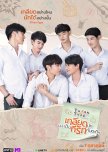Cette critique peut contenir des spoilers
An irredeemably toxic drama from the pen of a talent-free hack
As the meme goes, when the makers of 'TharnType: The Series' (TTTS) were asked which problematic tropes they wanted to include, they said, "Yes." This series features, and almost always romanticizes, sexual misconduct, sexual assault, child molestation, gang rape, intrafamilial lust, aggressive homophobia, partner violence, emotional manipulation, stalking, blackmail—you get the picture. As if not content with these horrors, it perpetuates further outrages by trivializing trauma from sexual abuse and conflating homosexuality with pedophilia. No topic is heavy or taboo enough to escape treatment in a frivolous, inane manner.
I am well aware that this series was adapted from a web novel, and it certainly bears the imprints of the conventional sort of talent-free hack that haunts self-publishing platforms. If TTTS is any indication, MAME can be safely said to have: an impoverished imagination; little curiosity about, much less empathy for, other people, especially queer people; non-existent literary standards; and an outsize, puerile desire to be as "edgy" and "shocking" as possible. The production team, having been tasked to bring such a terrible, toxic narrative to onscreen life, can hardly be expected to depart radically from the source material.
Amid all these, the sole bright point of TTTS is its cast. When they are not enacting the above-mentioned problematic tropes, the performers do eke out moments of genuine affection and tenderness, whether filial, platonic, or romantic. The chemistry between Mew Suppasit and Gulf Kanawut, who play the titular characters, definitely helped in their love scenes—when these were scenes of actual love, rather than of forced intimacy. Techno (Mild Suttinut), Type's best friend, is hilarious, and the interactions between siblings Tharn, Thorn (Tong Thanayut), and Thanya (Maria Tiprada) are heartwarming. It is unfortunate that these moments are far too occasional, and insufficiently influential on the story, to even begin to redeem the series.
I am well aware that this series was adapted from a web novel, and it certainly bears the imprints of the conventional sort of talent-free hack that haunts self-publishing platforms. If TTTS is any indication, MAME can be safely said to have: an impoverished imagination; little curiosity about, much less empathy for, other people, especially queer people; non-existent literary standards; and an outsize, puerile desire to be as "edgy" and "shocking" as possible. The production team, having been tasked to bring such a terrible, toxic narrative to onscreen life, can hardly be expected to depart radically from the source material.
Amid all these, the sole bright point of TTTS is its cast. When they are not enacting the above-mentioned problematic tropes, the performers do eke out moments of genuine affection and tenderness, whether filial, platonic, or romantic. The chemistry between Mew Suppasit and Gulf Kanawut, who play the titular characters, definitely helped in their love scenes—when these were scenes of actual love, rather than of forced intimacy. Techno (Mild Suttinut), Type's best friend, is hilarious, and the interactions between siblings Tharn, Thorn (Tong Thanayut), and Thanya (Maria Tiprada) are heartwarming. It is unfortunate that these moments are far too occasional, and insufficiently influential on the story, to even begin to redeem the series.
Cet avis était-il utile?




